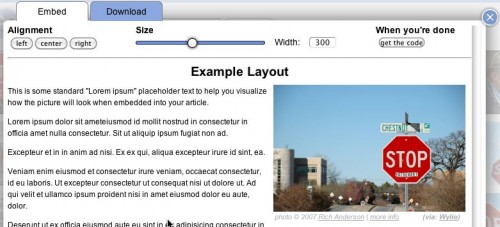Wylio: Making Creative Commons Easier
 To be clear, Wylio is not the first or only company to try and solve the problem of using CC-licensed images on Flickr, but it may be the best. Previous attempts have included the OpenAttribute Firefox plugin, the PhotoDropper WordPress plugin and even a simple bookmarklet among many others.
To be clear, Wylio is not the first or only company to try and solve the problem of using CC-licensed images on Flickr, but it may be the best. Previous attempts have included the OpenAttribute Firefox plugin, the PhotoDropper WordPress plugin and even a simple bookmarklet among many others.
All of these tools are designed to overcome the same problem: While there are thousands upon thousands of images available for easy reuse under Creative Commons Licenses in Flickr, properly attributing those images is time-consuming and can be very confusing.
However, Wylio takes things a step farther. Rather than just making it easy to add attribution to an image, Wylio helps by resizing and formatting the image for easy inclusion in your blog.
But is Wylio really worth using? The answer really depends on your situation and what you’re trying to accomplish with CC-licensed images.
How Wylio Works

For anyone who has used a tool like PhotoDropper or even just a basic Flickr search, using Wylio should be pretty simple as the process is pretty much the same. To illustrate this, I’m going to walk you through the process of creating the image you see to the right, including resizing and adding the attribution.
First, one has to pull up the Wylio home page and then perform a basic search for the image that they are looking for. This works the same as any other image search, including Flickr’s.

Once that’s done, you then get a grid view of images that Flickr has returned and you can select the image that you want.

Once you do that, you are then greeted with a popup that presents several options for formatting the image including the ability to justify the image left, right or center, a slider to resize the image and, for premium users, a textbox for setting an absolute width of the image.

Once you’re done formatting the image you simply click “Get the Code” and then copy and paste that code into your post, being careful to not post it in between any existing HTML tags.

The process is fairly straightforward and usually only takes a few moments per image. That being said, more advanced users may want to look at Wylio’s premium account, which is $3 per month and enables downloading of images with attribution written to the image file itself (great for print use), the ability to customize credit colors and change many of the default settings.
With that being said, there’s a lot to like about Wylio and a lot of reasons to call it the best tool for inserting Creative Commons images into your blog.
What Wylio Gets Right
Having spent much of this morning toying with Wylio, there’s a lot that I like about it and a lot of reasons I’m very tempted to make greater use of it.
- Resizing Feature: Wylio is the only tool of its kind that I’m aware of that lets you resize images on the site before embedding rather than choosing from broad sizes such as “Small” and “Medium”. This gives Wylio much greater layout flexibility and makes it a lot easier to use, especially with its preview feature.
- Image Download: A compelling premium feature, the ability to download images with the attribution burned onto the file itself is very handy for those wanting to make print use of Flickr images. (Note: Sample downloaded image below.)
- Search Results: Though this is more a product of Flickr than Wylio, the image search results on Wylio do appear to be very good, returning a reasonable number of results with decent accuracy even for strange terms.
- Speed: The process of using Wylio was fast, with almost no learning curve, good results and snappy response times. I was making my first embed within a minute of visiting the site.
- Good Pricing: $3 per months is definitely not a bad price point, not if the service works well. Though not free, as with similar tools, it’s a reasonable price if it can be justified.
All of this being said, Wylio is far from a perfect service and I certainly have my concerns/objections and they too have to be weighed.
Where Wylio Falls Down
With any new startup, especially considering they just launched the existing version of Wylio a few weeks ago, I would expect a few snafus. Still, they might be good reasons to avoid using the service, at least until the kinks are straightened out.
- Incomplete CC Attribution: When using the embed code, Wylio omits including a link to the license itself, which is a requirement under Creative Commons. The license is present on the downloaded version.
- The Wylio Link: Every downloaded image and every embed, regardless of whether you are a premium member, carries a link to Wylio.com. It would be trivial to remove this link from the HTML, but Wylio’s TOS forbids it. Considering that the link is “dofollowed”, repeated use of Wylio on your site might be seen as spammy by Google. Considering that the Wylio link is not part of the attribution for the image, it seems strange to be forced to link to them, even when paying.
- No Non-Commerical Images: Finally, since Wylio is a for-profit venture, they do not enable you to search for non-commercial licensed images, likely limiting the number of images available to you. That being said, Wylio does raise some interesting questions about the non-commercial clause in Creative Commons and how it applies to middle men, such as Wylio.
- Ugly HTML Code: The HTML code provided by Wylio is effective but it’s fairly ugly, you can see for yourself when you view the source of this page.
- Image Loads from Wylio: Finally, the images that you embed load from Wylio’s servers, which makes me nervous. Though I’m not against embedding images, Wylio is still a new service that hasn’t yet proved itself in this area.
Of these issues, the first two are the most disconcerting but also the easiest to fix. The rest are, for the most part, problems that are going to be inherent with using a service like Wylio and likely won’t be major issues but also can’t be easily avoided.
Bottom Line
Currently, I have six more days in my free trial of Wylio premium and, most likely, I’m going to cancel before that time is up. While I think that Wylio has some great features and is very compelling in many ways, the lack of a proper CC attribution and having the Wylio link forced on every embed is disconcerting. I can’t recommend using Wylio until those issues are corrected.
Even with those problems corrected, I doubt that I’m going to shift from making Morguefile my default image search site. By using a license that doesn’t require attribution, Morguefile avoids the issue altogether and offers a similar resizing tool that helps me get the image into the site easily.
Furthermore, I’m really fond of WordPress’ media uploader and like that Morguefile makes it easy to resize and download images for easy upload for free. While Wylio can do that, it’s a premium service and the attribution makes it harder to size appropriately.
In short, Morguefile is just easier and prettier when it’s all said and done and it avoids the thorny issues Wylio raises.
That being said, if you’re committed to using CC-licensed work on your blog, and there are many good reasons to be, Wylio is likely your best choice. PhotoDropper works well, but the flexibility provided by Wylio is just much greater as is the speed and ease of use.
For those wanting to embed CC images, Wylio is likely the best choice, especially if they are able to fix the issues I noticed. It may not be perfect, but it’s definitely a leap ahead.
Sample Downloaded Image

Want to Reuse or Republish this Content?
If you want to feature this article in your site, classroom or elsewhere, just let us know! We usually grant permission within 24 hours.
